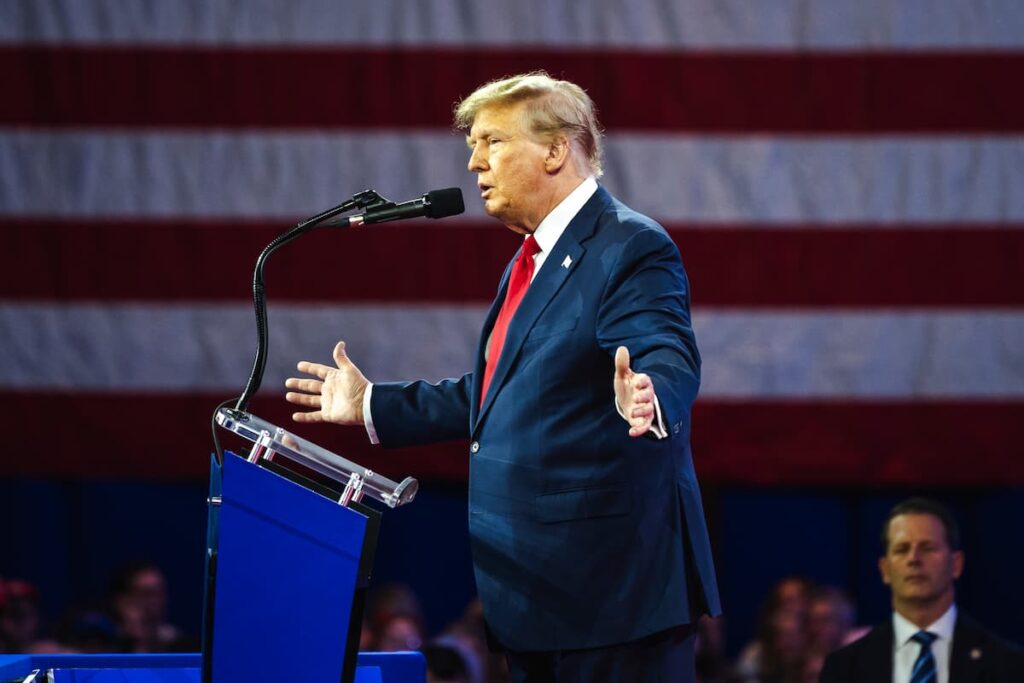Former U.S. President Donald Trump has revealed a bold foreign policy move by announcing plans to lift longstanding sanctions on Syria. This shift comes in the wake of the collapse of the Assad regime and the emergence of a new leadership under Ahmed al-Sharaa, signaling a significant reconfiguration of Middle Eastern geopolitics.
The announcement was made during a high-profile economic forum in Riyadh, where Trump appeared alongside Saudi Arabia’s crown prince. The decision reflects growing regional coordination and renewed engagement between the U.S. and the Middle East. Though formal diplomatic relations with the new Syrian government have not yet been reestablished, the move represents the most serious step toward normalization in over a decade.
A New Chapter for Syria
The end of the Assad era marked a dramatic turning point in Syria’s history. After decades of authoritarian rule and years of brutal conflict, the country has entered a period of transition under a new administration. Ahmed al-Sharaa, now at the helm of the Syrian government, rose to power following the regime’s fall and has since pushed for international recognition and economic recovery.
The planned removal of U.S. sanctions is expected to provide critical support to Syria’s reconstruction efforts. Economic restrictions had previously paralyzed vital sectors, including health care, education, and infrastructure. By easing these measures, the U.S. hopes to foster stability and open new opportunities for investment, trade, and regional cooperation.
This policy shift aligns with steps taken earlier this year by other global powers, such as the United Kingdom and the European Union, who began lifting portions of their own sanctions on Syria. The coordinated nature of these efforts suggests a growing consensus among Western allies to support Syria’s reintegration into the global economy—under the new leadership.
Regional Reactions and Political Calculations
The decision has sparked mixed reactions across the international stage. While several U.S. lawmakers, from both parties, have expressed cautious optimism, others have emphasized the importance of accountability and democratic legitimacy. The fact that Syria’s new leadership assumed power through military means, rather than a democratic process, remains a point of contention for some American officials.
Concerns have also been raised by U.S. allies in the region. In particular, Israel has voiced unease about the implications of the new Syrian government, especially given the historical ties between some of its members and militant organizations. Nevertheless, diplomatic dialogue remains active, with U.S. representatives planning meetings with Syrian officials to assess the situation and ensure stability.
Despite the geopolitical complexities, Trump’s administration appears confident in the decision. The former president has underscored the need to move past Syria’s violent past and create the conditions for peace and economic revival. U.S. engagement with Syria may open the door for broader collaboration in areas such as counterterrorism, refugee resettlement, and regional economic development.
Public Response and Hopes for Recovery
On the ground, Syrians have responded with visible enthusiasm. In cities like Homs and Latakia, large crowds gathered to celebrate the news, waving Syrian and Saudi Arabian flags, and expressing renewed hope for their country’s future. Street celebrations, fireworks, and public gatherings reflected a population eager to move forward after years of war and isolation.
The Syrian government has welcomed the decision as a turning point. Officials have highlighted the potential benefits of sanctions relief, including increased foreign investment and improved access to global financial systems. The expectation is that remittances from Syrians living abroad will begin to flow more freely, followed by larger investments from supportive nations.
The new economic path is also being viewed as a critical opportunity for Syria to regain its position within the global trade system. By reconnecting with financial institutions and international partners, the government hopes to accelerate recovery efforts and rebuild public services. Leaders have stressed that this is not only a diplomatic win, but a step toward national dignity and self-reliance.
Strategic Gains for Key Players
The announcement is also being interpreted as a diplomatic success for Saudi Arabia, which has played an increasingly active role in regional stabilization. The alignment between U.S. and Saudi interests in Syria indicates a shared strategy focused on peace, reconstruction, and balancing regional power dynamics.
For the United States, the policy shift may offer renewed influence in a region where its role has been challenged in recent years. By engaging with Syria’s new leadership and encouraging economic openness, the U.S. seeks to foster a model of recovery that moves beyond military intervention.
As international attention turns to Syria’s next steps, the country stands at a crossroads—between its traumatic past and the possibility of a rebuilt, more prosperous future. The lifting of sanctions may prove to be a catalyst, not only for economic renewal, but for a broader transformation that could redefine Syria’s place in the Middle East.


